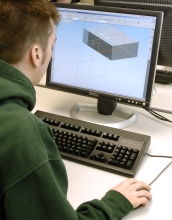|

Press Release 07-131
NSF Provides Funding to Transform Computing Education

Grants will transform computing curricula, better prepare students for the workforce
October 4, 2007
The National Science Foundation's (NSF) Directorate for Computer and Information Science and Engineering (CISE) has completed awarding grants for its CISE Pathways to Revitalized Undergraduate Computing Education (CPATH) program, an initiative that aims to transform undergraduate computing education on a national scale. More than 25 institutions across the country received grants totaling $6 million. The awards come at time when the computing field in the United States is at a critical crossroads. The nation is the world leader in computer science and engineering, but other nations are quickly catching up. Enrollment in computer science programs in the U.S. has declined in recent years. Despite the deep and pervasive impact of computing and the creative efforts of individuals in academic institutions, undergraduate computing education often looks much as it did several decades ago. In order for the U.S. to maintain its competitive edge, computing classes and curricula must keep students engaged while preparing them for careers in the 21st Century. "We need to inspire the best and brightest to go into computing," said Jeannette Wing, the NSF's associate director for CISE. "There remain in computer science many deep, challenging problems to be solved by the next generation." The CPATH initiative is intended to help create better computing education at the undergraduate level today to ensure the U.S. has the talented individuals it needs to meet those problems tomorrow. Grants went to researchers who are revitalizing computing education by creating new approaches to the subject that capture students' interest early, while providing tools they need to compete in the 21st Century global economy. Most awardees already had experience in linking their computing science classrooms with other academic universities, local communities or private industry to create a relevant and engaging course of study for undergraduates. "Workplaces have an understanding of their needs and unique lingo that does not always align with academia," said Tom Wolff, associate dean of undergraduate studies at Michigan State University's College of Engineering. Wolff is the principle investigator of a CPATH-funded project that will partner his college with a local community college and an industry consortium to better align computing education with the computational needs of the engineering workforce. Business and community leaders will work with the higher education sector to identify workforce computational skills and then define how those skills can be included in a curriculum that integrates computational problem-solving across engineering department courses. With this grant, Wolff said "we will be able to develop and define the process and provide a model that can be shared across the nation with other universities." Creating successful programs that can be replicated at other colleges and universities is key to the CPATH program's goal of transforming undergraduate computing education.
-NSF-

Media Contacts
Dana W. Cruikshank, NSF (703) 292-8070 dcruiksh@nsf.gov
Program Contacts
Harriet G. Taylor, NSF (703) 292-8950 htaylor@nsf.gov
Related Websites
For more information about CPATH, go to:: http://www.nsf.gov/funding/pgm_summ.jsp?pims_id=500025&org=CISE
NSF's Directorate for Computer and Information Science and Engineering (CISE): http://www.nsf.gov/dir/index.jsp?org=CISE

The National Science Foundation (NSF) is an independent federal agency that supports fundamental research and education across all fields of science and engineering. In fiscal year (FY) 2009, its budget is $9.5 billion, which includes $3.0 billion provided through the American Recovery and Reinvestment Act. NSF funds reach all 50 states through grants to over 1,900 universities and institutions. Each year, NSF receives about 44,400 competitive requests for funding, and makes over 11,500 new funding awards. NSF also awards over $400 million in professional and service contracts yearly.
 Get News Updates by Email Get News Updates by Email
Useful NSF Web Sites:
NSF Home Page: http://www.nsf.gov
NSF News: http://www.nsf.gov/news/
For the News Media: http://www.nsf.gov/news/newsroom.jsp
Science and Engineering Statistics: http://www.nsf.gov/statistics/
Awards Searches: http://www.nsf.gov/awardsearch/
| 

